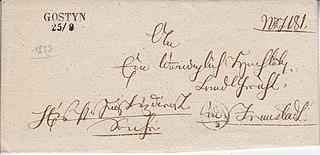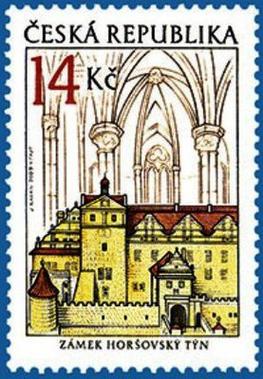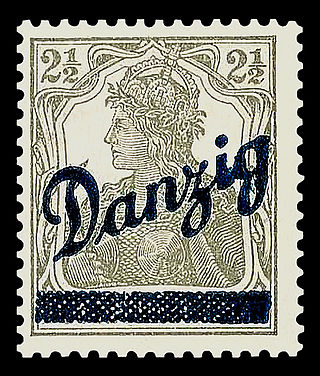| Founded | 1939 |
|---|---|
| Founder | Chester Mikucki |
| Type | 501(c)(3)not-for-profit organization |
| Focus | postage stamps and postal history of Poland |
| Location |
|
| Origins | Chicago, IL, USA |
Area served | Worldwide |
| Method | meetings, study groups, journal, exhibits, expertization |
Revenue | membership fees, contributions, and sales of memorabilia |
| Website | Polonus Philatelic Society |
The Polonus Philatelic Society is a society of stamp collectors who specialize in the postage stamps and postal history of Poland.
The members of the Polonus Philatelic Society are located throughout the USA and in several foreign countries. The society may be contacted via mail sent to: Polonus Philatelic Society, P.O. Box 60438, Rossford, Ohio, 43460-0438.
The Polonus Philatelic Society is a 501 (c)(3)not-for-profit organization incorporated in 1939 in the state of Illinois. The Society is organized exclusively for educational purposes with the objective of promoting Polish philately through the dissemination of information in the English language.
The society’s interests cover all aspects of Polish postage stamps and stamped covers.
Current study groups within the society center on:
The society issues a quarterly “Bulletin of the Polonus Philatelic Society” in the English language.

Philately is the study of postage stamps and postal history. It also refers to the collection and appreciation of stamps and other philatelic products. While closely associated with stamp collecting and the study of postage, it is possible to be a philatelist without owning any stamps. For instance, the stamps being studied may be very rare or reside only in museums.
This is a list of philatelic topics.
Polonus means "Pole" or Polish in Latin. In Polish it refers to a Pole living outside of Poland, a member of Polonia, the Polish diaspora. Regarding persons, Polonus was attributed to

The postage stamps and postal history of Israel is a survey of the postage stamps issued by the state of Israel, and its postal history, since independence was proclaimed on May 14, 1948. The first postage stamps were issued two days later on May 16, 1948. Pre-1948 postal history is discussed in postage stamps and postal history of Palestine.

This is a survey of the postage stamps and postal history of Estonia. The stamps of Estonia are issued by the postal administration Eesti Post which is the country's only provider of universal postal services.
The Fischer Catalogue of Polish stamps is a yearly publication in catalogue form of postage stamps relating to Poland.
The Ruch catalog of postage stamps of Poland, officially titled Ilustrowany Katalog Znaczków Polskich, contained detailed information on Polish postage stamps, and was published on a yearly basis.
The Stamp Specialist is the title of a series of books on philatelic research written and edited for the advanced collector of postage stamps.
William Hogarth Tower (1871–1950), of New Jersey, USA was a postage stamp collector who endowed a "stamp room" at Princeton University.
Otto Hornung was a distinguished philatelist and philatelic journalist who won Gold medals at several philatelic exhibitions and was a Fellow of The Royal Philatelic Society London. He signed the Roll of Distinguished Philatelists in 1993 and lived in Wembley, London.

The Gibraltar Study Circle is a global non-profit society based in the United Kingdom, founded by Walter (Wally) Jackson in 1975. Its aim is to expand the knowledge of the philately of Gibraltar, a British overseas territory located at the entrance to the Mediterranean Sea overlooking the Strait of Gibraltar. The study circle looks at the philately of Gibraltar in all its forms for the benefit of collectors (philatelists) from all walks of life. This includes studying the postal history, postage stamps, revenue stamps, postal stationery and associated overprints from Gibraltar and any of these used in Morocco. Any new information is shared with the membership via its quarterly journal, "The Rock", which has been published since 1975, showing articles of interest not only to philatelists but also historians, artists and sociologists.

Poczta Polska, the Polish postal service, was founded in 1558 and postal markings were first introduced in 1764. The three partitions of Poland in 1772, 1793 and 1795 saw the independent nation of Poland disappear. The postal services in the areas occupied by Germany and Austria were absorbed into those countries' postal services. In 1772 the area occupied by Austria was created into the Kingdom of Galicia, a part of the Austrian Empire. This lasted till 1918. The Duchy of Warsaw was created briefly, between 1807 and 1813, by Napoleon I of France, from Polish lands ceded by the Kingdom of Prussia under the terms of the Treaties of Tilsit. In 1815, following Napoleons' defeat in 1813, the Congress of Vienna, created Congress Poland out of the Duchy of Warsaw and also established the Free City of Kraków. Congress Poland was placed under the control of Russia and the postal service was given autonomy in 1815. In 1851 the postal service was put under the control of the Russian post office department regional office in St Petersburg. In 1855 control was restored for a while to the Congress Kingdom but following the uprising in 1863 again came under Russian control from 1866 and continued until World War I. In November 1918 the Second Polish Republic was created.
Mirosław Artur Bojanowicz was a Polish philatelist who settled in England after World War II and became a recognized expert on the stamps of Poland. He frequently served as a judge at international exhibitions and in 1966 was invited to sign the Roll of Distinguished Philatelists; Bojanowicz was one of very few professional philatelists to be accorded this honour.

This is a survey of the postage stamps and postal history of Slovakia.

This is a survey of the postage stamps and postal history of the Czech Republic.

This is a survey of the postage stamps and postal history of Czechoslovakia.

Janusz Marja Stefan Rogala Kaluski (1924–2010) was a sapper in the Polish Army who took part in the D-Day landings of World War II and who later won the Cross of Valour. In later life, Kaluski devoted himself to the philately of Poland, eventually becoming a Fellow of the Royal Philatelic Society London and donating his stamp collection of fifty years to the British Library Philatelic Collections in 2003.

This is an overview of the postage stamps and postal history of the Free City of Danzig .
The Kaluski Collection is a collection of stamps of Poland that forms part of the British Library Philatelic Collections. It was formed by Janusz Kaluski and donated to the library in 2003 and includes 46 volumes detailing the stamps and postal history material of Poland from 1835 to 2002.
Wolfgang Baldus is a German graphic designer, artist, and philatelic writer. He is known for authoring and publishing books on cinderella stamps in the series History and Background Stories of Unusual Stamps and for his works on the philatelic forgeries and propaganda parodies produced by both sides during the First and Second World Wars.